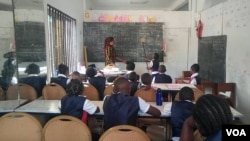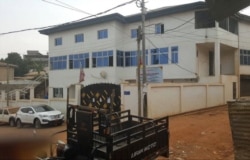Aid groups in Cameroon's capital, Yaounde, are this week going house-to-house to find neglected autistic children whose parents are keeping them out of school. The U.N. estimates there are 700,000 autistic people in Cameroon, many of them school-age kids, but says too many families keep them at home because of stigma and lack of resources.
To find some of them, a group of 15 aid workers and six parents in Cameroon’s capital, Yaounde, are visiting houses of families with autistic children.
Forty-year-old hairdresser Ernestine Ndiangang, the mother of an 11-year-old autistic boy, joined the group to urge parents to put their autistic children back in school.
"Let any woman that is hiding her child in the house know that she is destroying the child. Because when you bring that child forth to join with other children to learn you will see that that child will improve. I want to tell you parents that they no more lock children in the house. Come, there is a center here," she said.
Ndiangang said she once kept her own son at home, wrongly thinking that because he is autistic, he could never succeed at school.
An aid group convinced her that her son simply has difficulties interacting with others, and is slow to learn, but can still do well in school and have a social life.
The Timely Performance Care Center, a school for disabled children, organized the house-to-house initiative to find neglected autistic kids.
Manager of the Yaounde-based center Betty Nancy Fonyuy says autistic children are too often kept at home because of stigma and often are subject to abuse.
"Children living with Autism Spectrum Disorder are being locked up at home, isolated, beaten like animals. Some of their parents refuse to give them food because as they do not want them to mess up themselves and embarrass them. Some of them are locked up and their food sent into their rooms; the parents do not bathe them. Some of the children come to school with marks all over their body, some of them with swollen heads," Fonyuy said.
Yaounde-based aid groups estimate about 250 autistic children expected in schools this year in the capital were kept at home or withdrawn.
They say some parents justify keeping their autistic child at home because of public stigma, insults, and claims their child was born this way because of divine punishment.
Autist Hope Land’s Emmerencia Neba says another problem is money.
"Most parents are not able to even provide the basics. We are asking the parents that they should pay particular attention to the children's routine. They need to be loved, you need to show patience, you need to show endurance with them, give them the confidence. With love, patience and dignity, the children will be able to be independent and do things by themselves," Neba said.
Petronilla Ndigi, chief government social worker in Cameroon’s Center Region, said in the past three years authorities have been working to educate people to protect the rights of autistic children.
Ndigi said Cameroon is encouraging people to break the silence by reporting parents who decide to lock up their autistic children at home to public officials. She said the government has been educating communities against beliefs that parents who give birth to autistic children are suffering divine punishment for wrongdoing.
The aid workers enjoyed some success, convincing the parents of five autistic children to send their kids to school. The workers plan to visit more homes of autistic children in the near future.





